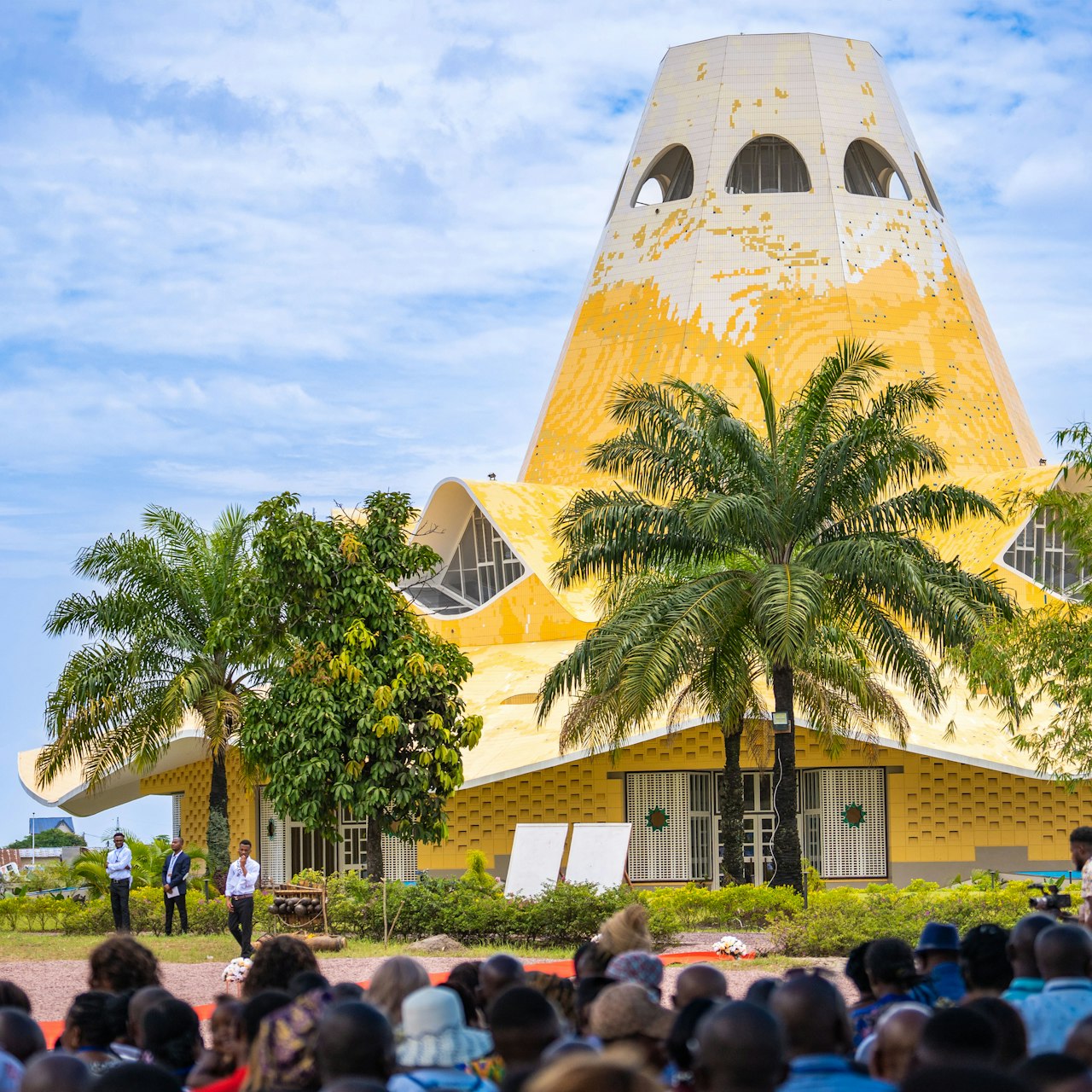
DRC
First national House of Worship opens its doors
Over 2,000 people from across the Democratic Republic of Congo gathered in Kinshasa today for the dedication of the first national Bahá’í House of Worship in the world.

Over 2,000 people from across the Democratic Republic of Congo gathered in Kinshasa today for the dedication of the first national Bahá’í House of Worship in the world.
KINSHASA, Democratic Republic Of The Congo — More than 2,000 people from across the Democratic Republic of the Congo (DRC), including some special guests from other countries, gathered in Kinshasa today for the dedication ceremony of the first national Bahá’í House of Worship in the Bahá’í world.
The program included remarks by Mélanie Bangala, a member of the Continental Board of Counsellors in Africa whom the Universal House of Justice had named as its representative to the event. Mrs. Bangala read a letter of the House of Justice addressed to the gathering, which stated: “The House of Worship raised in this Congolese metropolis is… dedicated to uniting the worship of God and service to humanity, both vital to the regeneration of the world.”
The letter further stated: “Let this, your first House of Worship, be a beacon of light. May its walls reverberate with melodies of the Words of God; may it inspire acts borne of true faith; may it offer peace and tranquility to every soul who enters therein; and may it cast the light of universal felicity across the entire city of Kinshasa and the whole nation of the Democratic Republic of the Congo.”
The ceremony, which continues tomorrow, brought together government officials, traditional chiefs, religious leaders, members of Bahá’í institutions, and many other people throughout the vast country.
In his opening remarks, Lavoisier Mutombo Tshiongo, Secretary of the Bahá’í National Spiritual Assembly of the DRC, described the gathering as an expression “of the principle of unity in diversity—representing different peoples, ethnic groups, and tribes.”
Justin Kamwanya, another member of the National Assembly, offered remarks at the program, stating: “The House of Worship cannot be considered as an ordinary building or as any other place of worship we are accustomed to. It is a special building, especially charged with spiritual potentialities.
“As a place from which spiritual forces radiate, the House of Worship represents the expression of a common will and a burning desire to serve humanity.”
The event featured several choirs from diverse regions of the DRC, who had been practicing for more than three months in preparation for this special occasion. During a devotional program inside the temple, the words of Bahá’u’lláh, sung in both Lingala and French, profoundly resonated: “Possess a pure, kindly and radiant heart, that thine may be a sovereignty ancient, imperishable and everlasting.”
Reflecting on the event and the future of the temple, Nkulu Tomene Tutu, another member of the National Assembly, states: “Our country has more than 450 ethnic groups and this is a place where they can come together embracing the beauty of their diversity and their common humanity.”
Madeleine Lutchaka Fundi, a resident and participant at the ceremony, echoed this sentiment, saying: “The temple is a center destined to connect hearts to their creator.
“The soul has no gender, the soul has no tribe, the soul has no age, the soul has no social rank. It is for everyone. This is the essential characteristic of this structure—universality. We believe that it will enlighten the world. It is in fact, a lighthouse to dissipate the darkness of all these prejudices.”
A film titled A Remarkable Response: The Dawn of the Bahá’í Faith in the Democratic Republic of the Congo (English, French) was screened at the ceremony, featuring stories about the journey of the Bahá’ís of the country in their efforts to contribute to the material and spiritual progress of their society. The film can be viewed here in English and French.
Provided below is a glimpse of the historic dedication ceremony of the Bahá’í world’s first national House of Worship.
People from across the DRC—journeying from near and far—arriving at the temple site for the start of the dedication ceremony.
Images of the temple and its surrounding gardens.
The ceremony included prayers and quotations sung by several choirs from different regions of the DRC.
The gathering included government officials, traditional chiefs, and religious leaders.
A women’s group sings a song welcoming guests to the dedication ceremony.
The program included traditional dance and other artistic presentations.
Participants enter the House of Worship for a devotional program that included prayers and the reading of a message from the Universal House of Justice addressed to the gathering.
Mrs. Bangala read a letter of the House of Justice addressed to the gathering.
A choir singing a prayer put to music during the devotional program inside the central edifice.
The program included a devotional program inside the temple.
Participants leaving the temple following the devotional program.
The sacred Bahá’í symbol known as the Greatest Name has been placed at the apex of the dome of the temple. The Greatest Name is a calligraphic representation of the invocation “O Glory of the All-Glorious.”
Some of the members of the temple’s staff.
A view of one of the temple’s nine entrances.
A view of the temple at night.